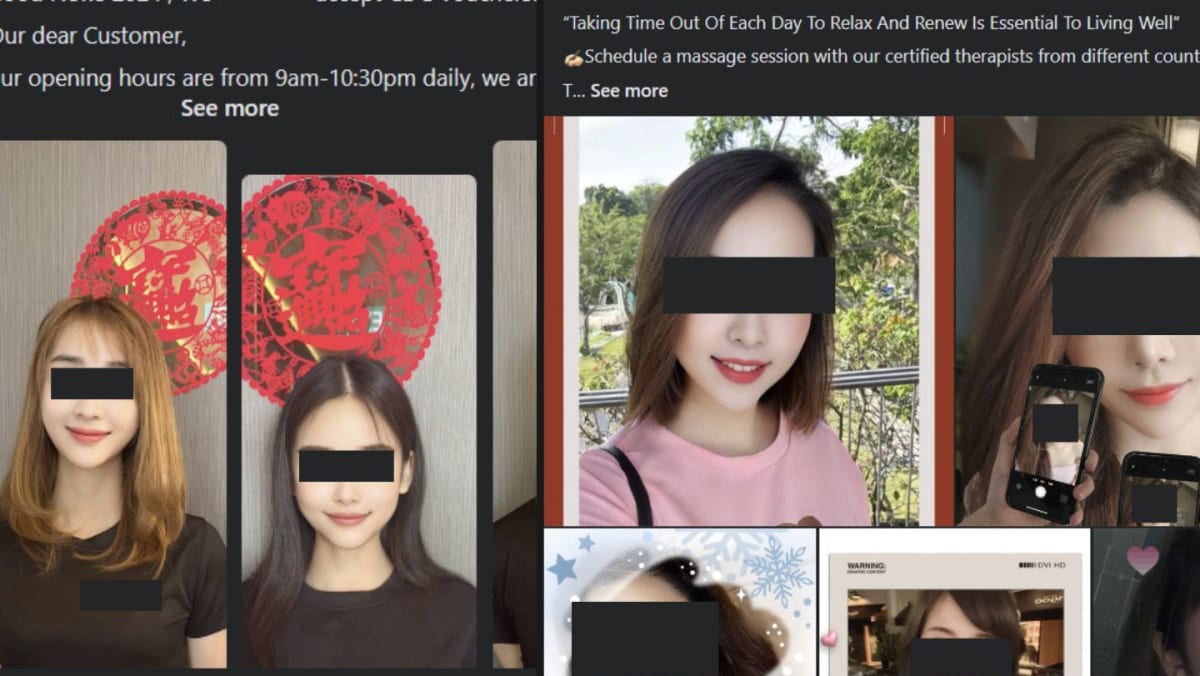
SINGAPORE — "Hot Oil Prostate Treatment", "Body Scrub Bubble Massage", "Boyzilian Waxing". Advertisements for dubious massage services claiming to accept government vouchers meant to defray living costs have sprouted up online this month, TODAY has found.
Since the launch of this year’s Community Development Council (CDC) vouchers on Jan 3, several massage establishments have invited customers to spend half their S$500 allotment — meant for use at heartland shops and hawkers — on such services.
These ads — which usually include suggestive photographs of female masseuses — have popped up on Facebook pages and groups, and public group chats on Telegram that promote massage services in Singapore.
A massage service known as "juagen", which involves the use of acupressure and other techniques to stimulate specific points on male genitalia, is also sometimes advertised.
The posts often indicate the name, location and contact numbers of the massage parlours.
As of last Wednesday (Jan 17), TODAY found that at least 15 of such establishments listed on the Government's CDCVouchersGoWhere website as registered heartland merchants participating in the scheme.
CDC vouchers were first introduced in June 2020 by Deputy Prime Minister and then-Finance Minister Heng Swee Keat, aimed at helping Singaporean lower-income households defray costs of living and supporting hawkers and heartland merchants affected by the Covid-19 pandemic.
The latest iteration of the scheme this year saw every Singaporean household receive a total of S$500 worth of vouchers — with S$250 allocated for spending at participating heartland retailers and the other half at participating supermarkets.
'SPECIAL SERVICES' OFFERED
TODAY patronised two massage establishments that accepted CDC vouchers in mid-January and requested a standard hour-long body massage at both.
Midway through the massages at both establishments, the masseuse attending to the reporter offered "special services" of a sexual nature, which the reporter declined.
After paying for the massages in cash, the reporter filed two police reports and notified the CDC that same day.
Massage establishments are regulated under the Massage Establishments Act to ensure that they do not cause social disamenities or conduct vice activities, the police said in response to TODAY’s queries.
They added that they would investigate those who flout the laws or breach their licensing conditions, and may suspend or revoke the establishment’s licence if evidence of serious offences is found.
At present, the terms and conditions for the vouchers listed on the CDC website state that they are "not valid for purchase of lottery products, petrol, diesel, alcohol or cigarettes".
Responding to TODAY’s queries on whether the CDCs conduct checks on these businesses, the councils said that they work closely with merchants to guide them on the scheme and brief them on the terms and conditions before onboarding those eligible.
"However, if any participating merchants are deemed to be offering illicit services, we will not hesitate to remove them from the scheme," they added.
As of Friday, both massage establishments patronised by TODAY are no longer listed on the CDCVouchersGoWhere website, but are still in operation.
The CDCs did not respond to queries on how the decision was made on what goods and services were deemed acceptable for purchase using its vouchers, and whether checks are conducted on every business before they are approved as a participating merchant.
They noted, however, that "the majority of heartland merchants in trades involving daily necessities and services and hawkers would generally be eligible".
'BALANCING ACT'
At the CDC voucher scheme’s launch event earlier this month, DPM Lawrence Wong said that the vouchers are part of a package implemented by the Government to cushion the effects of inflation.
Mr Christopher Gee, who heads the governance and economy department at the Institute of Policy Studies (IPS), said that the inappropriate use of CDC vouchers can hurt Singaporeans' "sense of fairness" — especially as the scheme is funded with taxpayers' money.
However, weeding out such improper usage comes with challenges.
"Generally, the more effort you put into defining your scheme carefully and regulating it, the more costly it is to administer," said Associate Professor of Economics at the Singapore University of Social Sciences Walter Theseira.
"For example, pre-qualifying shops and auditing them would help ensure the system meets the objectives, but also requires manpower cost."
Imposing more regulations to ensure vouchers are not abused may also end up disadvantaging segments of the population who benefit most from the scheme, said Mr Gee, as "increased friction" can lead to a reduced take-up from both consumers and merchants.
"It may mean that it is more difficult for your aunties and uncles who are not-so-capable of handling all these (rules) to navigate them," he said.
"This contradicts the goal of helping out the people who need these vouchers to mitigate the cost of living. At the end of the day, (the scheme) is meant to be an efficient way of redistribution."
As of Jan 5, about 60 per cent of 1.27 million Singaporean households have already claimed their S$500 CDC vouchers, Mayor of South West District Low Yen Ling said in a Facebook post earlier this month.
Ms Low, who is also the Minister of State for Culture, Community and Youth as well as Trade and Industry, added that about S$8 million worth of CDC vouchers had already been spent within two days of this year’s launch.
Should members of the public come across instances of merchants accepting CDC vouchers for the purchase of illegal goods and services, they may contact the People's Association at 6225 5322, or the police at 1800-255-0000 or www.police.gov.sg/iwitness.
Adblock test (Why?)




































































































